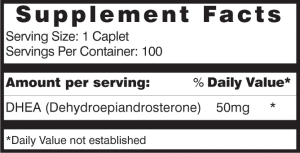Revealed: Testosterone Therapy May Enhance Sexual Drive and Energy Levels
 In a major new study published in the New England Journal of Medicine, testosterone therapy was found to improve physical ability and mood as well as sexual function. The study was a collaboration of researchers from 12 medical centers spanning the United States.
In a major new study published in the New England Journal of Medicine, testosterone therapy was found to improve physical ability and mood as well as sexual function. The study was a collaboration of researchers from 12 medical centers spanning the United States.
Mark E. Molitch, MD, an endocrinologist, was one of the authors of the study. Dr. Molitch is the Martha Leland Sherwin professor in medicine-endocrinology at the Northwestern University Feinberg School of Medicine.
“In recent years, talk about low testosterone and its treatments have become part of the public discussion,” explained Molitch. “Yet questions have always lingered about the treatment’s effectiveness and safety. I believe the results of this large, nationwide study will provide doctors and patients answers and guidance they’ve been looking for.”
Link between Testosterone, Mood, Libido and Physical Health
The team’s purpose was to determine the link, if any, between testosterone levels and the mood, libido, and physical ability of men over the age of 65. It is a well-established fact that a man’s testosterone levels and production decrease as he ages. Many men also experience lowered sex drive and energy levels as they become older, tiring and fatiguing more easily. For the first time, low testosterone has been established as the cause of these symptoms.
Testosterone Therapy Study Grant
Previously, the Institute for Men reported that there was insufficient evidence of testosterone therapy’s beneficial effects, if any. A grant from the National Institute on Aging and National Institutes of Health funded the new study to determine low testosterone could be the cause of what many consider the normal effects of aging.
Health Study on Testosterone Therapy
The subjects of the study were 790 men, all of whom were over the age of 65 and tested for low blood testosterone, as well as suffering from decreased sexual desire and physical function. Some participants in the study were given testosterone treatments in the form of a gel to apply directly to the skin. The medication increased the subjects’ testosterone levels to the normal range for men aged 19-40. The treatments and study of their effects lasted for over a year.
The study participants who received the testosterone treatments did not report increased energy, but their mood, libido, and physical function did improve. By measuring the distance walked in six minutes, the researchers were able to determine a small increase in the physical abilities of men in the study. There was also a decrease in symptoms of depression, such as feelings of sadness and listlessness.
“Men in the study experienced an increased sexual desire and small improvements in their mood and physical function,” explained Molitch. “Importantly, there was no evidence of an increase in heart or other cardiovascular issues in those who received testosterone compared to a placebo. And we monitored the men in this study for at least a year after receiving treatment.”
The study is expected to lead to further research in the potential applications of testosterone therapy in treating many of the problems that come with age. By firmly showing the link between low testosterone and decreased sexual activity, mood, and physical capabilities, the door is open to developing treatments for these common ailments.
Revealed: Testosterone Therapy May Enhance Sexual Drive and Energy Levels
Saleamp Design April 26th, 2016
Posted In: Testosterone Therapy
Tags: depression, endocrinology, fatigue, libido, low t, low testosterone, mood, sadness, sex drive, testosterone, testosterone therapy
Testosterone Therapy Found to Ease Male Depression
 Male depression is not as well understood as female hormonal depression. The effect of female sex hormones on our mood and psyche has been well-documented. Phenomena such as post-partum depression and mood swings just prior to menstruation are well-known, and there have been a number of scientific studies confirming them.
Male depression is not as well understood as female hormonal depression. The effect of female sex hormones on our mood and psyche has been well-documented. Phenomena such as post-partum depression and mood swings just prior to menstruation are well-known, and there have been a number of scientific studies confirming them.
Until recently, though, the link between our mood and the male sex hormone testosterone has not been nearly as well understood. A study conducted by researchers at MedUni Vienna and published in Biological Psychiatry offers the first glimpse into how testosterone affects our mood.
Testosterone and Male Depression
In a nutshell, the study concluded that there is a direct link between testosterone levels and feelings of happiness. Testosterone also supports existing antidepressant medications, allowing them to work better.
As they age, men typically become more prone to depression. Conventional wisdom has been that the drop-off in testosterone production is to blame, but the new study is the first to show that testosterone actually increases the number of serotonin transporters in the brain.
How Serotonin levels Contribute to Male Depression
Serotonin is the neurotransmitter, or brain chemical, most responsible for feelings of well-being and happiness. Serotonin transporters are proteins that help regulate the concentration of serotonin in our brains. By increasing their number, the overall serotonin levels in our brains also increase, contributing to our emotional well-being.
Antidepressant drugs bind to these proteins, as well. By increasing production of serotonin transporters, testosterone creates a better environment for these medications, allowing them to more effectively treat male depression.
The MedUni Vienna researchers worked with transsexuals undergoing hormone therapy in the course of their study. Georg Kranz, the study’s primary author, explained the design of the study.
“Transsexuals are people who feel that they are living in the wrong body and who therefore want high doses of opposite gender hormone therapy to adapt their appearance to that of the other gender. Genetic women are given testosterone, while genetic men are given oestradiol and medications to suppress testosterone production.”
Testosterone and Antidepressants
Siegfried Kasper, head of the Department of Psychiatry and Psychotherapy at MedUni Vienna, elaborated further on their findings and results.
“The study has shown that testosterone increases the potential binding sites for commonly prescribed antidepressants such as SSRIs in the brain and therefore provides major insights into how sex hormones affect the human brain and gender differences in psychiatric illnesses.”
Employing positron emission tomography (PET), the researchers were able to measure serotonin transporter levels in the study participants. Four weeks of testosterone therapy resulted in significantly higher serotonin transporter levels. The study established a firm link between testosterone levels in the blood and serotonin transporter levels in the brain.
The study opens up potential applications for testosterone therapy in treating male depression and other emotional disorders. Testosterone improves our mood both directly and by supporting antidepressant medications, and the reverse is also true. Low levels of testosterone can lead to male depression and feelings of sadness.
Testosterone Therapy Found to Ease Male Depression
Saleamp Design April 22nd, 2016
Posted In: Health & Wellness
Tags: anti-depressants, antidepressants, depression, low t, low testosterone, male depression, mood, sadness, Serotonin, SSRIs, testosterone therapy
DHEA Benefits and Frontiers
 Dehydroepiandrosterone (DHEA) is a naturally occurring hormone produced in the body. Secreted by the adrenal glands, it is precursor to other hormones and is transformed by the body into specific hormones once it reaches the target tissue. As a prohormone, most of it effects are related to its end products as opposed to DHEA itself.
Dehydroepiandrosterone (DHEA) is a naturally occurring hormone produced in the body. Secreted by the adrenal glands, it is precursor to other hormones and is transformed by the body into specific hormones once it reaches the target tissue. As a prohormone, most of it effects are related to its end products as opposed to DHEA itself.
DHEA is gaining traction as an anti-aging supplement. It is also being explored as a treatment for several of the health conditions associated with aging.
DHEA and its effects
DHEA is often touted as a “youth restoring” hormone because of its reputation for slowing down the age process, improving general energy levels and cognitive skills. Because of this, many see it as a solution to regulate the side effects of aging and hormone depletion.
DHEA supplementation has shown an increase in energy, cognitive concentration, greater muscle mass/retention and slowing down the progression of Alzheimer disease. DHEA has been shown to have an influence on erectile dysfunction and lack of sex drive. In addition, Men with low DHEA more often experience depression as well as higher risks for overall mortality, including heart failure and cardiovascular threats.
DHEA Decline with Age
Unfortunately, DHEA production declines as its importance increases. DHEA production reaches its highest point during the 20s, but as one grows older, the body’s DHEA production decreases, leaving as little as 20% of the healthy output by the time one reaches 70.
Since it is a precursor to other hormones, this decline leads to a corresponding effect in other hormones as well. Estrogen and testosterone synthesis, in particular, wane once the DHEA levels decrease. This brings forth several consequences for both sexes. In men, specifically, age-related DHEA decrease leads to a decline in testosterone secretion. This decline is compounded because of the larger role DHEA plays in the production of testosterone as we age.
DHEA Supplements and their Effects
From trials, DHEA supplements have been shown to increase muscle mass, strength and physical well-being in general. In addition, tests of increased concentration, in men and women, have been shown to improve sexual potency and mood, with women experiencing less menopausal symptoms after taking supplements. Overall, DHEA has been seen as an anti-aging supplement, providing bone and muscle strength, better moods and immune system and increased memory.
When tested on patients with diabetes and neurological disorders, DHEA was not seen to improve erectile function and potency in patients. It has also been shown to exhibit minimal side effects such as mild acne, swollen ankles and increased facial hair in some women.
The effect of long term treatment on cardiovascular conditions and hormone-dependent tumors has not yet been studied, or have yielded conclusive results.
DHEA Frontiers
DHEA supplements for anti-aging purposes are currently gaining traction. As a precursory hormone, it is seen by many as a way to regulate hormone balance within the body. In addition, DHEA’s reputation in increased bone and muscle strength, as well as energy, has many physicians exploring DHEA supplements and its effect on bone growth, depression, and other mood and cognitive disorders.
Hormone Therapeutics
Hormone Therapeutics specializes in endocrine and hormone-related treatment, and is committed to finding the best treatment for your well-being. If you’re curious about how DHEA supplements can improve you and your life, Hormone Therapeutics can provide the answers for you. Call us today!
Do You Need Help?
Hormone Therapeutics is the leading national company assisting men who want to get their lives back through Hormone Replacement and Testosterone Replacement therapy. Our local physicians are ready to treat you anywhere in the entire country. Hormone Therapeutics is pioneering an easier, cost efficient and more private way for you to work with our clinical advisors and physicians from the privacy of your home or office after your local physical exam confirms you have one of the symptoms of Low T.
Contact us today and our clinical advisors will work with you on a hormone therapy program that may include prescribed hormones, exercise, nutrition and sleep programs to reclaim your vitality.
DHEA Benefits and Frontiers
Saleamp Design April 1st, 2016
Posted In: Health & Wellness
Tags: brain, brain fog, cardiovascular issues, Cialis, Dehydroepiandrosterone, depression, DHEA, ED, energy, erectile dysfunction, fatigue, hair loss, happiness, heart attack, low t, low testosterone, memory, muscle loss, muscle mass, sadness, sex drive, sexual function, stroke, supplements, testosterone, Viagra
Revealed: How Testosterone Converts to Estrogen to Battle Depression
 A recent study at the George Washington University, found that men diagnosed with borderline low testosterone levels had much higher rates of experiencing depression and depressive symptoms compared to the general population. In the study, 56% of the male participants were diagnosed with depression while 25% were already taking medications for this.
A recent study at the George Washington University, found that men diagnosed with borderline low testosterone levels had much higher rates of experiencing depression and depressive symptoms compared to the general population. In the study, 56% of the male participants were diagnosed with depression while 25% were already taking medications for this.
Produced in the testicles, testosterone helps drive a man’s production of sperm, muscle strength and mass, sex drive, facial and body hair and bone density. Men who don’t produce the normal amount of testosterone may have a condition called hypogonadism.
To Ward off Depression, Testosterone Converts to Estrogen
Testosterone, the male sex hormone, seems to have anti-depressant like properties, yet the exact mechanism of its effect still remained unclear.
In 2012, Mohammed Kabbaj and Nicole Carrier, both researchers at the Florida State University College of Medicine, are working to elucidate such mechanisms. They have found out that a particular pathway called MAPK pathway in the hippocampal region, a part of the brain, involved in regulation of stress responses and memory formation, plays a vital role in mediating the effect of testosterone.
Low Testosterone and Depression
Between men and women, females are typically more prone to suffer from depression, however, men diagnosed with low T or hypogonadism are also predisposed to depression or anxiety. Fortunately, hormone replacement therapy has been found to effectively enhance mood.
While it may seem that much is already known, it’s still very important to fully understand where and how these effects are happening so that scientists can develop better, targeted antidepressant therapies.
In the study, Kabbaj performed several experiments in neutered male rats and found that the rats manifested depressive-like behaviors that were then reversed by supplemental testosterone replacement.
According to the researcher, in order to protect males with hypogonadism from developing depression, testosterone in the brain must be converted to estrogen. Kabbaj stated a certain brain enzyme ‘mediates’ the conversion of testosterone to estrogen. Furthermore, inhibiting such enzyme in the hippocampal area has prevented the antidepressant effect of testosterone. This makes the conversion to estrogen vital.
In this study, the antidepressant effect of supplementing low testosterone to normal levels has only manifested in male rats, not in female rats.
Do You Need Help?
Hormone Therapeutics is the leading national company assisting men who want to get their lives back through Hormone Replacement and Testosterone Replacement therapy. Our local physicians are ready to treat you anywhere in the entire country. Hormone Therapeutics is pioneering an easier, cost efficient and more private way for you to work with our clinical advisors and physicians from the privacy of your home or office after your local physical exam confirms you have one of the symptoms of Low T.
Contact us today and our clinical advisors will work with you on a hormone therapy program that may include prescribed hormones, exercise, nutrition and sleep programs to reclaim your vitality.
Revealed: How Testosterone Converts to Estrogen to Battle Depression
Saleamp Design March 29th, 2016
Posted In: Low T Info
Tags: antidepressant, bone density, depression, hair loss, hormone replacement therapy, hypogonadism, low t, muscle strength and mass, sadness, sex drive, sex hormone, sperm, testosterone, testosterone levels


